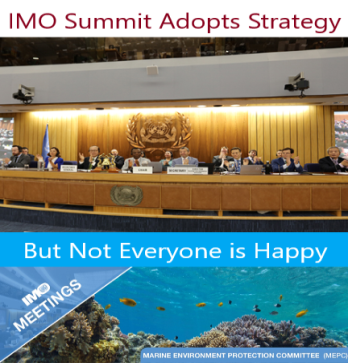Member States of the International Maritime Organization (IMO), meeting at the Marine Environment Protection Committee (MEPC 80), have adopted the 2023 IMO Strategy on Reduction of Green House Gas (GHG) Emissions from Ships, with enhanced targets to tackle harmful emissions.
The Summit was held from 03 to 07 July at the IMO’s headquarters in London, with a view to setting out clear goals to revise its GHG Strategy.
The revised Strategy includes an enhanced common ambition to reach net-zero GHG emissions from international shipping close to 2050, a commitment to ensure an uptake of alternative zero and near-zero GHG fuels by 2030, as well as indicative check-points for 2030 and 2040.
MEPC 80 highlights:
- Tackling climate change – cutting GHG emissions from ships – Including adoption of the revised IMO GHG Strategy
- Energy efficiency of ships
- Ballast water management – including approval of the Convention Review Plan and adoption of amendments to the BWM Convention
- Biofouling management – revised Guidelines
- Designation of a Particularly Sensitive Sea Area
- Underwater noise – revised guidelines
- Tackling marine litter
- Ship-to-ship transfer – proposed Assembly resolution
- Special areas – effective date for the the Red Sea and the Gulf of Aden special areas under MARPOL Annexes I and V
- Other matters from the PPR Sub-committee
Download the 2023 Strategy – 21 pages in PDF format (text subject to final editorials).
Levels of ambition directing the 2023 IMO GHG Strategy are as follows:
.1 Carbon intensity of the ship to decline through further improvement of the energy efficiency for new ships – to review with the aim of strengthening the energy efficiency design requirements for ships;
.2 Carbon intensity of international shipping to decline – to reduce CO2 emissions per transport work, as an average across international shipping, by at least 40% by 2030, compared to 2008;
.3 Uptake of zero or near-zero GHG emission technologies, fuels and/or energy sources to increase – uptake of zero or near-zero GHG emission technologies, fuels and/or energy sources to represent at least 5%, striving for 10%, of the energy used by international shipping by 2030; and
.4 GHG emissions from international shipping to reach net zero – to peak GHG emissions from international shipping as soon as possible and to reach net-zero GHG emissions by or around, i.e. close to 2050, taking into account different national circumstances, whilst pursuing efforts towards phasing them out as called for in the Vision consistent with the long-term temperature goal set out in Article 2 of the Paris Agreement.
Putting a Positive Spin on it for Shipping
IMO Secretary-General Kitack Lim said:
“The adoption of the 2023 IMO Greenhouse Gas Strategy is a monumental development for IMO and opens a new chapter towards maritime decarbonization. At the same time, it is not the end goal, it is in many ways a starting point for the work that needs to intensify even more over the years and decades ahead of us. However, with the Revised Strategy that you have now agreed on, we have a clear direction, a common vision, and ambitious targets to guide us to deliver what the world expects from us.”
“Above all, it is particularly meaningful, to have unanimous support from all Member States. In this regard, I believe that we have to pay more attention to support developing countries, in particular SIDS and LDCs, so that no one is left behind,” he said.
Negative Comments from social groups:
Civil society groups expressed their concern about the IMO’s “failure to firmly align global shipping with the Paris Agreement’s 1.5°C temperature-warming limit”.
“This week had everything to be a historical moment. The last chance for the IMO to align with the Paris Agreement temperature goal of 1.5°C, […] This agreement does not get us nowhere (sic) near 1.5°C.” (Ana Laranjeira, Shipping Manager at Opportunity Green).
“There is no excuse for this wish and a prayer agreement. They knew what the science required, and that a 50% cut in emissions by 2030 was both possible and affordable. Instead the level of ambition agreed is far short of what is needed […].” (John Maggs, Clean Shipping Coalition).
“This week’s climate talks were reminiscent of rearranging the deckchairs on a sinking ship. The IMO had the opportunity to set an unambiguous and clear course towards the 1.5ºC temperature goal, but all it came up with is a wishy-washy compromise […].” (Faig Abbasov, Transport & Environment).
“…This Strategy will see the shipping industry exhaust its 1.5oC carbon budget by 2032.” (Madeline Rose, Pacific Environment).
“The way the International Maritime Organisation has watered down its climate ambition will sink the shipping sector’s chances of meeting its Paris Agreement commitments. […].” (Daniele Rao, Carbon Market Watch).
Also read our related articles:
Clean Containers: Upcoming Workshop
Cargo Vessels: Fuels of the Future
For more information about international shipping and Customs clearance contact us here at Colless Young. As licensed Customs Brokers and International Freight Forwarders we offer correct, professional advice on all your import and export trade transactions. We are based in Brisbane and provide a complete range of logistics services, for both airfreight and sea cargo through all Australian ports and airports.

